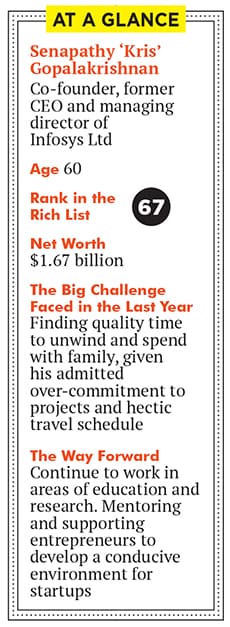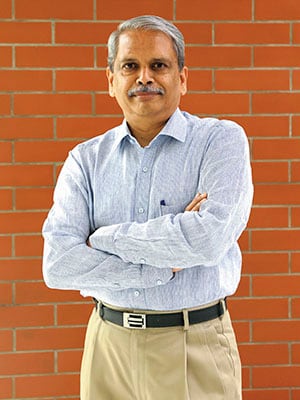
Kris Gopalakrishnan: The accidental engineer
Since retiring from Infosys, Kris Gopalakrishnan immersed himself in philanthropy. Even in this new role, he remains wedded to entrepreneurship and technology, which became his calling by chance
It was a mix of destiny and free will that brought Senapathy ‘Kris’ Gopalakrishnan to the C-suite at Infosys. “My parents wanted me to pursue medicine as a career because we didn’t have a doctor in our [extended] family,” says Gopalakrishnan. To fulfil his parents’ wish, he studied science with physics, chemistry and biology (without mathematics) after high school, at a local college in his home town of Thiruvananthapuram in Kerala.
But in the sudden freedom of college life, he began to slack off. “When you first taste freedom from school rules, you don’t care about attendance. I was the same and it showed in my results. My marks were not sufficient to get me an admission for an MBBS course,” Gopalakrishnan tells Forbes India.
Left with few options, he decided to enrol for a BSc in physics at University College, Thiruvananthapuram in 1972. He soon faced another hurdle: His grasp over mathematics wasn’t strong enough. His tuition teacher, CC Phillips, came to his rescue and helped him with the subject. Gopalakrishnan graduated with a high score and, more importantly, he managed to get admitted to the Indian Institute of Technology, Madras (IIT-M), for a Master’s degree in physics.
IIT opened up a whole universe of opportunities; here, Gopalakrishnan was initiated into the world of computers. “I got so hooked to computers that post my Master’s [in 1977], I enrolled for an MTech in computer science at IIT-Madras itself. It gave me access to computers just when they were making their foray into India,” he says.

Armed with his newly acquired coding skills, Gopalakrishnan found a job at Patni Computer Systems (PCS) in Mumbai as a campus recruit software engineer immediately after his MTech in 1979. There, he met NR Narayana Murthy, who was heading the software division at Patni, and the other (soon-to-be) co-founders of Infosys. “I never thought of entrepreneurship then. When Mr Murthy said he was going to start a company and requested me to join him, I agreed. It was easy to take that decision. I didn’t have much to lose. I was only 25 years old,” he says. The rest, as they say, is history.
Infosys, which was started by seven engineers in 1981 with a paltry sum of $250, has now crossed revenues of $8 billion. The Bengaluru-based IT firm boasts of a workforce of over 1,79,000 people, 85 sales and marketing offices and 100 development centres globally. Gopalakrishnan served as the chief executive officer and managing director of Infosys between June 2007 and August 2011. In June last year, he stepped down as executive vice chairman of the IT major. In October 2014, he retired, relinquishing his duties as vice chairman of the board.
Since leaving Infosys, Gopalakrishnan has preferred to keep a low profile, while devoting a major portion of his time to philanthropy. The reticent billionaire’s personal passion for computers and technology also reflects in his charitable works. The entrepreneur—also a recipient of the Padma Bhushan, India’s third highest civilian award—has lent his support for areas of brain research. “One aspect [of brain research] focuses on the medical side; that is, disorders related to ageing such as Alzheimer’s, Parkinson’s and dementia. These disorders are expensive to treat, especially in developing countries. I felt India must play an important role in the clinical research on such diseases,” Gopalakrishnan points out, adding that the second area of research is computational brain research. “These are aspects we can learn by studying how the human brain functions. This understanding is critical to create better computers.”
For medical brain research, Gopalakrishnan works with the Indian Institute of Science (IISc) and the National Institute of Mental Health and Neurosciences (Nimhans), both in Bengaluru, and other hospitals. “On computational brain research, I work with both IIT-Madras and IISc. But, these won’t be just standalone initiatives; there will be collaboration with other centres such as the National Centre for Biological Sciences, Bengaluru, and the Carnegie Mellon University (CMU) in the US. We are looking for more such collaborations,” he says.
In January 2014, the Pratiksha Trust—the Gopalakrishnan family’s philanthropic foundation—granted $36 million (around Rs 230 crore) to set up a Centre for Brain Research at IISc. As part of the collaboration, the foundation will provide the money over a period of 10 years towards the establishment and functioning of the centre. Once set up, the institution will also get support from the IISc’s Centre for Neuroscience and other research facilities and collaborate with hospitals across Bengaluru. The centre aims to study the functioning of the brain and find cures for neurodegenerative
diseases such as Alzheimer’s, Parkinson’s and schizophrenia. “It is a ten-year programme because research takes time. We are bootstrapping and identifying a director who will head all operations,” says Gopalakrishnan. An international scientific advisory board, with Nobel laureate professor Torsten Wiesel as chairman, has been set up to guide the Centre for Brain Research.
Gopalakrishnan, who is ranked 67th on the 2015 Forbes India Rich List with a net worth of $1.67 billion, made a personal grant of $1.8 million (around Rs 12 crore) to CMU in July 2014 to establish a research partnership between the Pittsburgh-based university and the Centre for Brain Research. The donation was aimed at leveraging the research strength of both the institutions and providing seed funding for research that connects CMU with IISc scientists.
Pratiksha, the charitable trust that he started with wife Sudha about 12 years ago, provides scholarships to students for higher studies besides supporting initiatives in research and entrepreneurship.
Among other programmes, the trust offers scholarships through Sri Ramakrishna Ashrama in Kerala to meritorious students who want to pursue engineering and medical courses. Currently, Pratiksha supports 170 students under the programme.
Besides his philanthropic work, Gopalakrishnan has also kept his entrepreneurial roots intact by mentoring and providing financial support to early-stage startups. In October 2014, Gopalakrishnan along with Infosys co-founder SD Shibulal, former Infosys board member Srinath Batni, Harvard Business School professor Tarun Khanna and Ganapathy Venugopal, former head of strategy and planning at Infosys, launched Axilor Ventures. The Bengaluru-based incubator mentors startups, runs entrepreneur-in-residence programmes and funds early-stage ventures. Gopalakrishnan serves as non-executive chairman of Axilor.
“We plan to run Axilor in an operationally and intellectually rigorous way, that’s the way to distinguish it from other incubators and startup accelerators. Kris (Gopalakrishnan) is crucial to this of course, given his operational and strategic insights and his interest in the core animating idea behind each venture we considered. He’s a clear thinker who gets to the essence of things quickly and is also very constructive in his criticism. All valuable attributes,” says Khanna, co-founder, Axilor Ventures.
“I have funded some startups because I wanted to support their ventures. I’m not looking at huge returns from my investments. It has more to do with supporting young and bright entrepreneurs with good ideas,” says Gopalakrishnan, whose willingness to fund startups that use complex technology, and are not me-too ideas, has won him the admiration of young entrepreneurs.
Umesh Sachdev, co-founder and CEO, Uniphore Software Systems, feels Gopalakrishnan brings unique value to the table as an investor. “He is somebody who has helped build Infosys from the ground up into an IT giant. He knows the problems entrepreneurs could face on hiring, HR, customers and processes. I don’t think any of my investors or venture capitalists could bring that kind of experience,” he says. In April this year, Gopalakrishnan invested an undisclosed amount in Chennai-based Uniphore that develops speech recognition software.
In his investor avatar, Gopalakrishnan has gained the reputation of being extremely entrepreneur friendly. “He has not put any framework or guideline that I need to report to him on a frequent basis. At the same time, whenever I need help on any issue, he’s always a call away and responds promptly. He is hands-on in terms of help that we need from him,” says Sachdev.
Earlier this year, Gopalakrishnan funded Bengaluru-based FreshWorld, an offline fruits and vegetables delivery startup. The one-year-old company operates through its custom-built, battery-operated vans selling fruits and vegetables across localities in the city. Also this year, he invested in JetSynthesys, a technology company in the digital space with a presence in gaming, adverting and music. JetSynthesys is part of the Navani family-owned Jetline Group of companies.
Gopalakrishnan also works closely with 30-year-old Sanjay Vijayakumar, chairman, Startup Village, a Kochi-based not-for-profit technology business incubator, which launched in 2012 on a private-public-partnership (PPP) model involving the government’s department of science and technology. Gopalakrishnan is the chief mentor of the Startup Village and has also invested an undisclosed amount in it.
Calling him a karma yogi (a doer), Vijayakumar says, “Kris has taught me to keep the interest of everyone in mind while making a decision and be grounded in life. I first met him in 2005 when I was in my third year of engineering at the University of Kerala. We were learning how to establish a startup and I was inspired by the Infosys story. I didn’t know anyone so I just found his email ID and wrote to him. To my surprise, he responded, saying that he will call me when he comes to Thiruvananthapuram. Since then, he has been a constant guide.”
The Startup Village today hosts more than 800 startups in Kochi, with another centre coming up in Visakhapatnam as the Andhra Pradesh government is keen on replicating the successful model.
Gopalakrishnan divides his time among his multiple engagements across advisory and board roles.
He chairs the Confederation of Indian Industry (CII) Council on innovation and entrepreneurship, a national platform that supports entrepreneurship. He serves on the board of governors at IIT-Madras, and Indian Institute of Management-Bangalore. He is the chairman of the board at IIIT, Bengaluru, and is also one of the trustees of the Chennai Mathematical Institute. He also served as the president of CII for 2013-14, and was one of the co-chairs of the World Economic Forum held in Davos last year.
Infosys co-founder and friend SD Shibulal sums Gopalakrishnan up quite succinctly. “He handles crisis and challenging situations with poise. A lateral thinker, he has in-depth knowledge of current trends and technology. He is a gentleman and kind, considerate and trusting as a leader. Truly, one who creates and inspires hope.”
In a sense, Gopalakrishnan says he owes his accomplishments to his failure to get admitted to a medical college as a teenager. He considers his initial failures as stepping stones to success. “The dream of me becoming a doctor was my parents’, not mine. When I failed to get a medical seat, my parents gave me the freedom to follow my own path. I learnt then, that success will follow your own motivation and drive; it will not come if you live somebody else’s dream.”
Success rests lightly, though, on Kris, as he is all too aware of the pressures that it brings. Perhaps a tad wistfully, he recounts the freedom of youth and the privilege of making mistakes without facing much consequence. But though experience and expectation have helped Gopalakrishnan be more measured in his approach, the passion to follow his dreams still burns bright.
(This story appears in the 30 November, -0001 issue of Forbes India. To visit our Archives, click here.)






